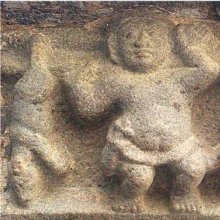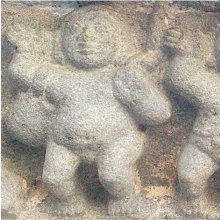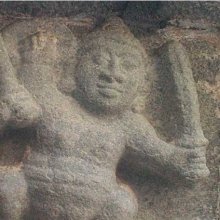Bhaktavatsala, Bhaktavatsalā, Bhakta-vatsala: 8 definitions
Introduction:
Bhaktavatsala means something in Hinduism, Sanskrit, Marathi. If you want to know the exact meaning, history, etymology or English translation of this term then check out the descriptions on this page. Add your comment or reference to a book if you want to contribute to this summary article.
Images (photo gallery)
In Hinduism
Vaishnavism (Vaishava dharma)
Source: Pure Bhakti: Brhad BhagavatamrtamBhaktavatsala (भक्तवत्सल) refers to:—Śrī Kṛṣṇa who is affectionate to His devotees and who relishes blessing them, hearing their prayers, and interacting with them. (cf. Glossary page from Śrī Bṛhad-bhāgavatāmṛta).

Vaishnava (वैष्णव, vaiṣṇava) or vaishnavism (vaiṣṇavism) represents a tradition of Hinduism worshipping Vishnu as the supreme Lord. Similar to the Shaktism and Shaivism traditions, Vaishnavism also developed as an individual movement, famous for its exposition of the dashavatara (‘ten avatars of Vishnu’).
Purana and Itihasa (epic history)
Source: archive.org: Shiva Purana - English TranslationBhaktavatsalā (भक्तवत्सला) (Cf. Bhaktapriya) refers to “she who is favourably disposed to your devotees” and is used to describe the Goddess Śivā (Umā/Durgā), according to the Śivapurāṇa 2.3.6.—Accordingly, as the Gods eulogised Goddess Śivā who was residing in the womb of Menā:—“O Goddess, be victorious, O intelligent one, O mother of the universe, O great Goddess, O you of true rites, prone to truth, true in three things, O truth-formed. O you stationed in truth, we have sought refuge in you. O you delighted with truth, Origin of truth, Truth of Truth, of truthful sight. O beloved of Śiva, great goddess, O destroyer of the miseries of gods, you are the mother of the three worlds, consort of Śiva, pervasive and favourably disposed to your devotees [i.e., bhaktavatsalā]. [...]”.

The Purana (पुराण, purāṇas) refers to Sanskrit literature preserving ancient India’s vast cultural history, including historical legends, religious ceremonies, various arts and sciences. The eighteen mahapuranas total over 400,000 shlokas (metrical couplets) and date to at least several centuries BCE.
Languages of India and abroad
Marathi-English dictionary
Source: DDSA: The Molesworth Marathi and English Dictionarybhaktavatsala (भक्तवत्सल).—a (S) Gracious or propitious to his worshipers. Ex. tō bha0 tatvatā || pragaṭalā tēthēñci ||.
Source: DDSA: The Aryabhusan school dictionary, Marathi-Englishbhaktavatsala (भक्तवत्सल).—a Gracious to his worshippers.
Marathi is an Indo-European language having over 70 million native speakers people in (predominantly) Maharashtra India. Marathi, like many other Indo-Aryan languages, evolved from early forms of Prakrit, which itself is a subset of Sanskrit, one of the most ancient languages of the world.
Sanskrit dictionary
Source: DDSA: The practical Sanskrit-English dictionaryBhaktavatsala (भक्तवत्सल).—a. kind of worshippers or devotees.
-laḥ Name of Viṣṇu.
Bhaktavatsala is a Sanskrit compound consisting of the terms bhakta and vatsala (वत्सल).
Source: Cologne Digital Sanskrit Dictionaries: Monier-Williams Sanskrit-English DictionaryBhaktavatsala (भक्तवत्सल):—[=bhakta-vatsala] [from bhakta > bhaj] mfn. kind to worshippers or to faithful attendants, [Monier-Williams’ Sanskrit-English Dictionary]
Source: Cologne Digital Sanskrit Dictionaries: Yates Sanskrit-English DictionaryBhaktavatsala (भक्तवत्सल):—[bhakta-vatsala] (laḥ-lā-laṃ) a. Kind to worshippers (God).
Sanskrit, also spelled संस्कृतम् (saṃskṛtam), is an ancient language of India commonly seen as the grandmother of the Indo-European language family (even English!). Closely allied with Prakrit and Pali, Sanskrit is more exhaustive in both grammar and terms and has the most extensive collection of literature in the world, greatly surpassing its sister-languages Greek and Latin.
Kannada-English dictionary
Source: Alar: Kannada-English corpusBhaktavatsala (ಭಕ್ತವತ್ಸಲ):—[noun] (said of a god) he who treats his devotees very affectionately.
--- OR ---
Bhaktavatsaḷa (ಭಕ್ತವತ್ಸಳ):—[noun] = ಭಕ್ತವತ್ಸಲ [bhaktavatsala].
Kannada is a Dravidian language (as opposed to the Indo-European language family) mainly spoken in the southwestern region of India.
See also (Relevant definitions)
Partial matches: Vatsala, Bhakta.
Starts with: Bhaktavatsalamahatmya, Bhaktavatsalate.
Full-text: Bhaktavatsalamahatmya, Pattavarcalan, Vatsala, Ninravur, Ksheptum, Anukampya, Katikai, Uddhartri, Sholingar, Bhaktapriya.
Relevant text
Search found 18 books and stories containing Bhaktavatsala, Bhaktavatsaḷa, Bhaktavatsalā, Bhakta-vatsala, Bhakta-vatsaḷa, Bhakta-vatsalā; (plurals include: Bhaktavatsalas, Bhaktavatsaḷas, Bhaktavatsalās, vatsalas, vatsaḷas, vatsalās). You can also click to the full overview containing English textual excerpts. Below are direct links for the most relevant articles:
Garga Samhita (English) (by Danavir Goswami)
Verse 5.16.15 < [Chapter 16 - Comforting Sri Radha and the Gopis]
Verse 8.13.47 < [Chapter 13 - A Thousand Names of Lord Balarāma]
Verse 5.15.30 < [Chapter 15 - Seeing Sri Radha]
Brihad Bhagavatamrita (commentary) (by Śrī Śrīmad Bhaktivedānta Nārāyana Gosvāmī Mahārāja)
Verse 2.4.227 < [Chapter 4 - Vaikuṇṭha (the spiritual world)]
Verse 2.2.108 < [Chapter 2 - Jñāna (knowledge)]
Verse 2.2.216 < [Chapter 2 - Jñāna (knowledge)]
Chaitanya Bhagavata (by Bhumipati Dāsa)
Verse 2.7.130 < [Chapter 7 - The Meeting of Gadādhara and Puṇḍarīka]
Verse 2.28.40 < [Chapter 28 - The Lord’s Pastime of Accepting Sannyāsa]
Verse 1.12.167 < [Chapter 12 - The Lord’s Wandering Throughout Navadvīpa]
Bhajana-Rahasya (by Srila Bhaktivinoda Thakura Mahasaya)
Text 6 < [Chapter 4 - Caturtha-yāma-sādhana (Madhyāhna-kālīya-bhajana–ruci-bhajana)]
Rudra-Shiva concept (Study) (by Maumita Bhattacharjee)
11. Destruction of Nṛsiṃha < [Chapter 5 - Rudra-Śiva in the Purāṇic Literature]
30. Avadhūteśvara manifestation < [Chapter 5 - Rudra-Śiva in the Purāṇic Literature]
M. Anantha Sayanam Ayyangar < [April – June, 2004]
Bhagavan Ramana and Vasishtha Ganapati Muni < [October - December 1976]
Bhagavan Ramana and Vasishtha Ganapati Muni < [July – September 1976]



